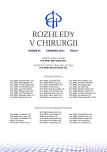-
Medical journals
- Career
Risks and complications of urological surgical procedures in elderly patients
Authors: J. Tomášek; J. Pacovsky; M. Broďák
Authors‘ workplace: Urologická klinika FN a LFUK Hradec Králové, přednosta: doc. MUDr. M. Broďák, Ph. D.
Published in: Rozhl. Chir., 2014, roč. 93, č. 7, s. 386-390.
Category: Original articles
Podpořeno programem PRVOUK P37/04
Overview
Introduction:
Surgical procedures in elderly patients are associated with a higher risk of complications. The main goal of this study was to evaluate the results and complications of urological surgeries in elderly patients.Material and methods:
A retrospective study was completed, evaluating the perioperative and early postoperative complications in patients over the age of 75. In total, 221 patients that underwent urological surgery between January 2011 and December 2012 were evaluated. The mean age of the patients was 78.Results:
The patient cohort that was evaluated experienced 48 (22%) complications; one death (<0.5%) and 4 (<2%) underwent repeat surgery due to serious complications. Infection was the most common complication: sepsis or surgical site infection. Other complications included respiratory insufficiency, delirium, bleeding etc.Conclusion:
Urological surgery in patients above the age of 75 is safe, provided all pre-op procedures are executed correctly and prevention of possible complications is dealt with appropriately. Based on our results, the risk of complications falls within an acceptable range.Key words:
urological surgery in elderly patients, complications associated with urological surgery − Dindo-Clavien classification.
Sources
1. Revenig LM, Canter DJ, Taylor MD, et al. Too frail for surgery? Initial results of a large multidisciplinary prospective study examining preoperative variables predictive of poor surgical outcomes. J Am Coll Surg 2013;217 : 665−670.
2. Brodak M, Pacovsky J, Kosina J, et al. Antibiotic prophylaxis in urology. Rozhl Chir 2009;88 : 357−63.
3. Dindo D, Demartines N, Clavien PA. Classification of surgical complications. A new proposal with evaluation in a cohort of 6336
Patients and Results of a Survey. Ann Surg 2004;240 : 205–13.
4. Robinson TN, Eiseman B, Wallace JI, et al. Redefining geriatric preoperative assessment using frailty, disability and co-morbidity. Ann Surg. 2009;250 : 449−55.
5. Zenilman ME. Geriatric risk assessment in surgery: Keeping it simple. JAMA Surg 2013;148 : 1138−1139.
6. Robinson TN, Raeburn CD, Tran ZV, et al. Postoperative delirium in the elderly: risk factors and outcomes. Ann Surg 2009;249 : 173−8.
7. Ahmed NN, Pearce SE. Acute care for the elderly: A literature review. Popul Health Manag 2010;13 : 219−225.
8. Bartoníčková K. Klinická praxe při hospitalizaci u infekce močových cest. Urolog pro Praxi 2010;11 : 192−195.
9. May M, Fuhrer S, Braun KP, et al. Results from three municipal hospitals regarding radical cystectomy on elderly patients. Int Braz J Urol 2007;33 : 764−7.
10. Peyromaure M, Guerin F, Debre B, Zerbib M. Surgical management of infiltrating bladder cancer in elderly patients. Eur Urol 2004;45 : 147−53.
11. Guňka I, Dostalík J, Martínek L, et al. Pokročilý věk – indikace nebo kontraindikace laparoskopické kolorektální chirurgie? Rozhl Chir 2010;89 : 628−633.
12. Svatoň R, Man M, Kala Z, et al. Výsledky resekční léčby pankreatu u starších a geriatrických pacientů. Rozhl Chir 2008;87 : 521−526.
Labels
Surgery Orthopaedics Trauma surgery
Article was published inPerspectives in Surgery

2014 Issue 7-
All articles in this issue
- Interdisciplinary European guidelines on metabolic and bariatric surgery
- Risks and complications of urological surgical procedures in elderly patients
- Staged management of open tibial fractures with soft tissue defect
- Sarcoma of the chest wall after radiotherapy for breast carcinoma – a case report
- Treatment strategy for ruptured abdominal aortic aneurysms
- Pancreatic leakage and acute postoperative pancreatitis after proximal pancreatoduodenectomy
- Perspectives in Surgery
- Journal archive
- Current issue
- Online only
- About the journal
Most read in this issue- Treatment strategy for ruptured abdominal aortic aneurysms
- Sarcoma of the chest wall after radiotherapy for breast carcinoma – a case report
- Risks and complications of urological surgical procedures in elderly patients
- Pancreatic leakage and acute postoperative pancreatitis after proximal pancreatoduodenectomy
Login#ADS_BOTTOM_SCRIPTS#Forgotten passwordEnter the email address that you registered with. We will send you instructions on how to set a new password.
- Career

